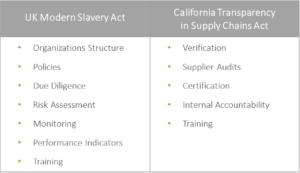We are at the threshold of a new level of requirements and expectations for reporting of non-financial information (NFI) such as Sustainability/Corporate Social Responsibility (CSR). New laws, norms and regulations that require reporting on Supply Chain that you have been hearing about for the past few years are now coming into force. These new imperatives bring increased scrutiny and expectations from clients, customers, and all stakeholders of CSR practices and transparency in your supplier monitoring and engagement practices, and many companies are looking for guidance on how to prepare.
To this end, EcoVadis recently hosted a webinar that gathered three CSR experts to discuss key new Supply Chain sustainability reporting requirements, and how to prepare for them. The webinar was designed to address key facts and issues laws and regulations that are impacting the supply chain environment.
The first part of the discussion began exploring the importance of reporting on sustainability performance, underlining stakeholder’s expectations, continuous improvement, and long term business growth. One of the key notes on the introduction emphasized the obligation that large companies face in order to meet stakeholder demands, and by regulators than ever before. The discussion dove into how the landscape for Sustainability and CSR reporting is changing fast, going beyond direct operations to include third-parties; revealing gaps for many companies in their reporting disclosures around environmental, social and business ethics information on their suppliers.
In the next section, the panel discussed the increasing sense of urgency created by Mandatory Human Rights disclosures. As the second phase of the UK Modern Slavery Act disclosures is approaching, it is key for companies to understand regulatory expectations. The UK Modern Slavery Act and the California Transparency Supply Chain Act share common themes in mandatory disclosure requirements. However, if companies are impacted by both laws, they will need to report separately to fulfill each requirement.
Here is a brief summary of both laws showing the main items related specifically to supply chain:

Despite the gaps in information that are being released on these Mandatory Disclosures Requirements, some positives sides were also observed:
- 77% of companies surveyed in a recent report by Ergon indicated that their organizations are placing an enhanced focus on risk monitoring following the passage of the UK Modern Slavery Act.
- 74% of companies surveyed are placing an increased focus on policy development around anti-slavery issues.
- However, disclosures of audit results and remedy efforts are largely absent.
Lastly, on the EU Reporting Directive section, EcoVadis experts provided the background information of the law, referring to the environmental, social and governance aspects. Two main blocks are required on the report. The non-financial statements, covering the description of the policies and commitments related to the CSR areas, the processes implemented to support such commitments, along with the main risks related to the matters listed, and their linkage to the business operations. The second block concerns the diversity disclosure, covering the diversity policy within the Corporate Government Statement.
Finally, the webinar closed the loop by advising companies to identify the mandatory disclosures laws that impact their compliances obligations; to outline a timeframe to collect the necessary data; and most importantly to leverage as many reporting frameworks as possible to understand the CSR management gaps.
To watch the webinar again, click here
To learn more how you can get the right supply chain data for your reporting, contact us.
You might also want to read:
Implications of the Modern Slavery Act for Companies Operating in the U.K.
Human Rights Rising On The Corporate Risk Agenda: The Intertwining Of Corruption And Human Rights






















